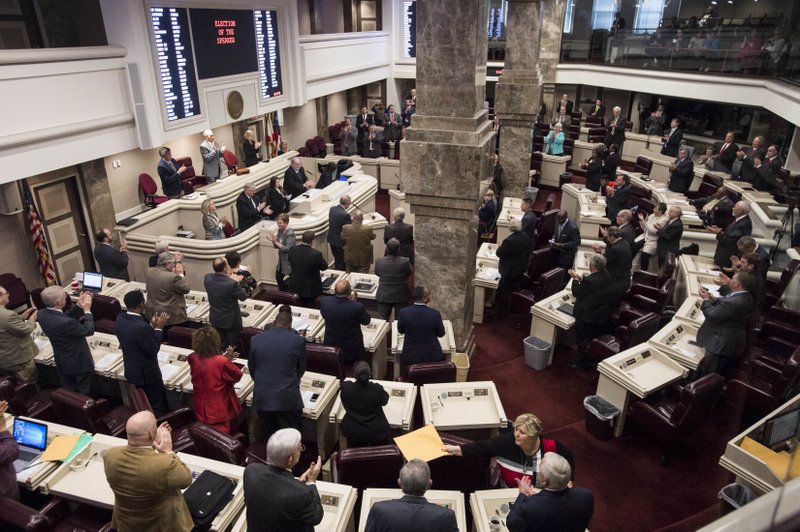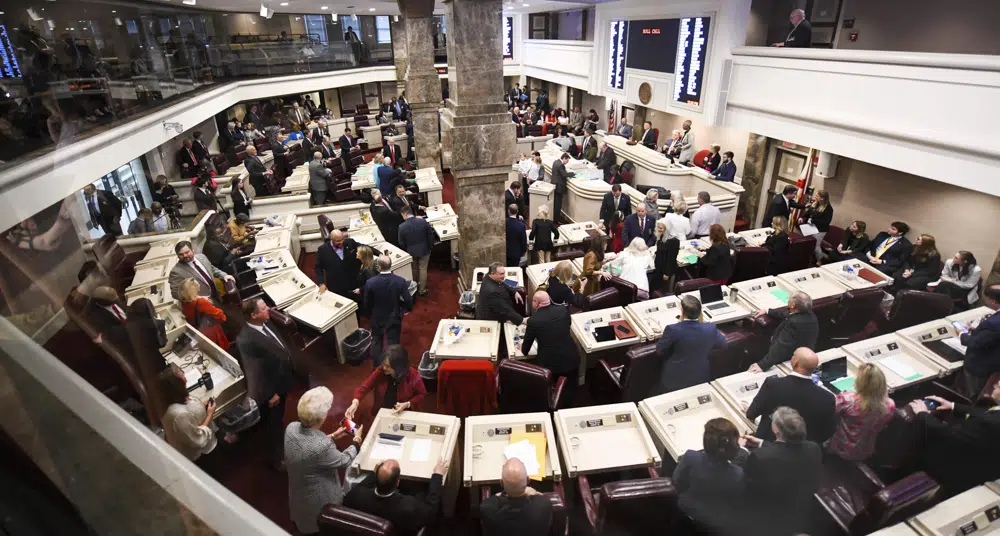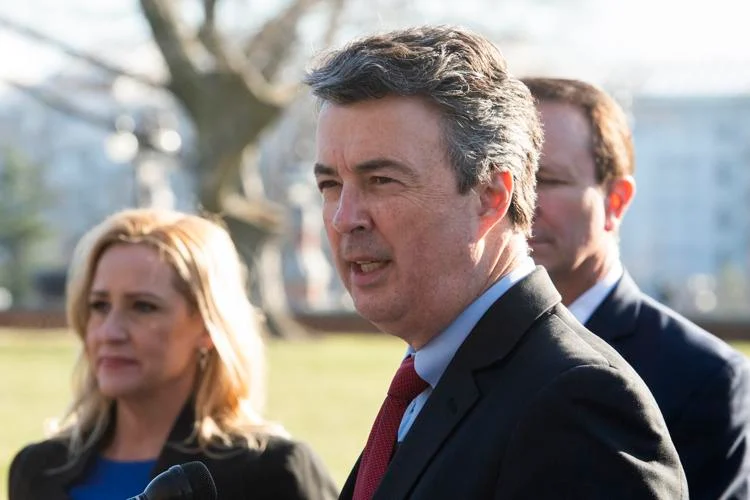Legislature passes legislation to allow law enforcement officers to make arrest for parole or probation violations

On Tuesday, the Alabama Legislature approved bipartisan legislation allowing law enforcement officers to arrest persons for parole or probation violations. Senate Bill 157 (SB157) is sponsored by State Senator Chris Elliott (R-Fairhope) and carried in the Alabama House of Representatives by House Public Safety and Homeland Security Committee Chairman Allen Treadaway (R-Morris). Rep. Treadaway is a retired Birmingham Deputy Chief of Police. “This allows for a law enforcement officer to arrest a parolee that is violating the terms of his parole,” Treadaway explained. “What this bill does is allow the law enforcement officer to make that arrest if he witnesses the parolee committing a parole violation.” Treadaway explained that under current law, only parole officers can arrest a felon for violating the conditions of their parole or probation. Ordinarily, the parole officer will authorize law enforcement to make the arrest. “When we find them violating the terms of parole, we have to notify the parole officer,” Treadaway explained. This legislation was modified in the State Senate to require law enforcement officers who arrest parolees to notify the Bureau of Pardons and Paroles after the law enforcement officer makes the arrest. “He has four hours to notify the Board of Pardons and Paroles that he has taken that action,” Treadaway said. Rep. Thomas Jackson (D-Thomasville) expressed his concerns that this has the potential for an officer to harass a parolee. “You are giving those people some wrong ideas,” Rep. Jackson said. “If his parole says that he can’t go near children, and he is attending children’s events and hanging around schools, don’t you want the law enforcement officer to make that arrest?” Treadaway replied. Jackson responded, “There could be a grudge against someone. You know how that happens.” “The intent is well and good, but this can cause collateral damage and unintended consequences,” Jackson said. SB157, as enrolled, would “Allow a law enforcement officer to arrest a parolee or probationer without a warrant in certain circumstances; to require the Board of Pardons and Paroles to send the Alabama State Law Enforcement Agency the conditions of parole for an individual released on parole; to require a court to provide to the Alabama State Law Enforcement Agency the conditions of probation for an individual released on probation; and to require the Alabama State Law Enforcement Agency to make the conditions of parole or probation available to law enforcement officers and other authorized persons through the Law Enforcement Tactical System.” The House of Representatives passed SB157 in a vote of 80 to 17. The legislation had already passed the Alabama Senate by a vote of 33 to 0. The bill has now gone to the governor for her consideration. Tuesday was Day 30 of the 2023 Alabama Regular Legislative Session. The Alabama Constitution forbids any regular legislative session to go beyond 30 days. Barring a second special session being called by Alabama Governor Kay Ivey, the Legislature will next meet on February 6, 2024. To connect with the author of this story or to comment, email brandonmreporter@gmail.com.
Alabama Legislature passes retail theft bill

The Alabama House of Representatives on Wednesday voted to pass legislation creating the crime of organized retail theft. The new bill will levy heavy criminal penalties on people engaged in organized retail theft. The Senate concurred with the House changes to the bill. Senate Bill 206 (SB206) is sponsored by State Senator Clyde Chambliss (R-Prattville). SB206 is being carried in the House of State by Representative Allen Treadaway (R-Morris). Treadaway explained that cracking down on organized retail theft is necessary to protect the retail industry. “We are trying to keep these stores in the community,” Treadaway said in the House floor debate. “This is a $100 billion problem in America.” Rep. Mary Moore (D-Birmingham) was concerned that people might accidentally be charged with this crime. “When the store is having a sale and goes through and marks through the price with a pen, a shopper could be accused of having marked through the price themselves,” Moore argued. “You have to show intent,” Treadaway said. “That applies right now.” “This bill is trying to put the whole neighborhood in jail,” Moore said. “In my community, if we just walk through the store, people think we are trying to steal something.” “I don’t want us passing bills that may cause harm to innocent people accused of stealing something,” Moore said. Treadaway is a retired deputy chief of police for the City of Birmingham. “Mainly, what we are seeing is the organized crime that has infiltrated this kind of activity,” Treadaway said. Treadaway said this legislation “allows the law to reach out and hold the folks accountable when they are working together in this kind of activity.” Rep. Juandalynn Givan (D-Birmingham) said, “In the urban area, we are losing a lot of businesses. We are seeing where those storefronts are now abandoned.” “How do we identify the theft? How are we identifying the thief?” Givan asked. Treadaway explained, “The organized retail theft you are getting into now involves people working together.” Treadaway explained that organized crime then sells the stolen merchandise online or in a brick and mortar businesses that they operate. “It is happening everywhere,” Treadaway said. “We have seen a tenfold increase.” Rep. Prince Chestnut (D-Selma)asked, “Is legislation alone going to make the difference?” Treadway answered, “No, but it is a part of it.” Chestnut offered an amendment to the bill. “This is a (Judiciary) committee amendment,” Chestnut said. The House voted to adopt the first amendment in a 102 to 0 vote. Rep. Jeremy Gray (D-Opelika) brought a second amendment that was adopted by the House. This legislation is supported by the Alabama Retail Association. The Retail Theft Crime Prevention Act provides for the crime of retail theft in various degrees, provides for the crime of organized retail theft, and provides criminal penalties for a violation. Retail theft in the first degree would be a Class B felony. Retail theft in the second degree is a Class C felony. Retail theft in the third degree is a Class A misdemeanor. A fourth or subsequent conviction for an offense under this article is a Class C felony. Organized retail theft is a Class B felony. The House of Representatives voted 76 to 27 to pass the legislation. It had already passed the Senate. Late on Wednesday afternoon, the Alabama Senate voted 34 to 0 to concur with the House changes to the legislation. SB206 now goes to the governor for her consideration. Thursday will be day 29 of the 2023 Alabama Regular Legislative Session. To connect with the author of this story or to comment, email brandonmreporter@gmail.com.
Alabama House to consider ambitious special-order calendar on Wednesday

The Alabama House of Representatives will meet on Wednesday at 1:00 p.m. to consider a very ambitious proposed special-order calendar. Senate Bill 206 (SB206) is sponsored by State Senator Clyde Chambliss (R-Prattville). It is being carried on the floor by State Representative Allen Treadaway (R-Morris). SB206 creates the crime of organized retail theft and turns what used to be misdemeanor shoplifting into a felony. Senate Bill 261 (SB261) is sponsored by Sen. Dan Roberts (R-Mountain Brook). It is carried in the House by Rep. Chip Brown (R-Hollinger’s Island). The anti-ESG legislation would prohibit state and local governments from entering into certain contracts that boycott businesses in certain sectors or based on certain environmental or corporate governance criteria. Senate Bill 279 (SB279) is sponsored by Sen. Randy Price (R-Opelika) and carried in the House by Rep. Matt Woods (R-Jasper). SB279 deals with elected county superintendents of education. Under existing law, the salary for an elected county superintendent of education is required to be set by the county board of education before the beginning of the term of office. This bill would remove that requirement retroactive to July 1, 2021. Senate Bill 94 (SB94) is sponsored by Sen. April Weaver (R-Briarfield) and is carried in the House by Rep. Corley Ellis (R-Columbiana). SB94 would move the Shelby County juvenile probation services and probation officers into the state court system. Senate Bill 99 (SB99) is sponsored by Sen. Sam Givhan (R-Huntsville) and carried in the House by Rep. Prince Chestnut (D-Selma). SB99 would increase the mileage reimbursement rate received by jurors Senate Bill 56 (SB56) is sponsored by Sen. Arthur Orr (R-Decatur) and carried in the House by Rep. Allen Baker (R-Brewton). SB56 would require the use of video cameras in certain special education classrooms. Allen is bringing a substitute version of the bill. Senate Bill 292 (SB292) is sponsored by Sen. Roberts and carried by Rep. Joe Lovvorn (R-Auburn). SB292 would provide for the Department of Revenue to grant certificates of exemption from sales and use taxes to contractors and subcontractors licensed by the State Licensing Board for General Contractors for the purchase of building materials and construction materials to be used in the construction of a project for an entity that is exempt by law from paying sales and use taxes. Senate Bill 223 (SB223) is sponsored by Sen. Vivian Figures (D-Mobile) and carried in the House by Rep. Matt Simpson (R-Daphne) would include a child witness in the definition of “a physical offense, sexual offense, or violent offense” for the purpose of the Child Physical and Sexual Abuse Victim Protection Act. Senate Bill 309 (SB309) is sponsored by Sen. Chambliss and carried by Rep. Wood in the House. SB309 is related to contracts for professional services to provide for the procurement of certain professional service contracts based on competitive, qualification-based policies and procedures, as well as to provide for the advertisement of such contracts; and to subject such contracts to a fee schedule established by the Division of Construction Management of the Department of Finance. Senate Bill 198 (SB198) is sponsored by Sen. Orr and carried in the House by Rep. Cynthia Almond (R-Tuscaloosa). It would add additional offenses that would be subject to the presumptive sentencing guidelines; to modify the criminal penalties for criminal solicitation, attempt, and criminal conspiracy; to give a judge discretion when sentencing a person convicted of a Class C or Class D felony offense. Senate Bill 184 (SB184) is sponsored by Sen. Greg Albritton (R-Atmore) and carried in the House by Rep. Kyle South (R-Fayette). SB184 would authorize the Department of Corrections to expend funds for the recruitment and training of law enforcement officers and to further the mission of the department. South will introduce a substitute version of the bill. Senate Bill 224 (SB224) is sponsored by Sen. Figures and carried in the House by Rep. Simpson. It provides for the age of a child for the crime of transmitting obscene material to a child by computer, to establish jurisdiction for a violation of distributing a private image, and further provides for the crime of incest. Senate Bill 281 (SB281) is sponsored by Sen. Albritton and carried by Rep. Margie Wilcox (R-Mobile). SB281 creates a new distinctive license plate to benefit the USS Alabama Battleship Commission. Senate Bill 285 (SB285) is sponsored by Sen. Jones and carried in the House by Rep. Terri Collins (R-Decatur).SB285 will allow nonprofit organizations to host wine festivals. Senate Bill 176 (SB176) is sponsored by Sen Orr and carried by Rep. Collins. SB176 is the Student Right to Know Act of 2023. It requires the Alabama Commission on Higher Education to collect and make available online data for students to plan for their educational and professional futures; and for the Workforce Division of the Department of Commerce to share data and information with ACHE. Senate Bill 192 (SB192) is sponsored by Sen. Albritton and is carried in the House by Rep. Donna Givens (R-Loxley). SB192 would allow private corporations to limit access to industrial facilities and that industrial access roads to continue to be maintained as a public corporation. Senate Bill 263 (SB263) is sponsored by Sen. Donnie Chesteen (R-Dothan) and carried in the House by Rep. Terri Collins (R-Decatur). SB263 makes changes to the Alabama Accountability Act of 2013. It revises the law to change the term failing school to priority school and nonfailing to qualifying school to make other changes. Senate Bill 258 (SB258) is sponsored by Sen. Andrew Jones (R-Centre). It deals with nonprofit corporations that provide water services to the public authorizing a one-time audit by the Department of Examiners of Public Accounts. There is a substitute version of this bill. Senate Bill 103 (SB103) is sponsored by Sen. Orr: and carried by Rep. Almond. It would require the Alabama Ethics Commission to provide exonerating evidence to persons accused of ethics wrongdoing. Almond will introduce a substitute. Senate Bill 76 (SB76) is sponsored by Sen. Will Barfoot (R-Pike Road). It is carried in the House by Rep. Lovvorn. SB76 establishes the Rural Logging Support Act, funding supporting rural economic Development. Wednesday will be Day 28 of the 2023 Alabama Regular Legislative Session. To connect with the author of this story or to comment, email brandonmreporter@gmail.com.
House to address organized retail theft Wednesday

The Alabama House of Representatives will meet on Wednesday. The first item on the special-order calendar is legislation levying heavy criminal penalties on persons engaged in organized retail theft. Senate Bill 206 (SB206) is sponsored by State Senator Clyde Chambliss (R-Prattville). SB206 is being carried in the House of State by Representative Allen Treadaway (R-Morris). Rep. Treadaway is the sponsor of the House of Representatives version of the bill. Treadway warned in committee that without stiffer penalties on organized retail theft, more stores, including Wal-Mart and Target, will close. Treadaway said that organized teams of thieves are systematically preying on the state’s retailers. This legislation is supported by the Alabama Retail Association. The Alabama Retail Association released a statement saying, “Bills introduced this week will help put retail thieves behind bars while also punishing them financially. The Alabama Retail Association appreciates the Alabama District Attorneys Association for pursuing the legislation and the bill’s sponsors for introducing them. The retail theft/organized retail theft legislation makes it so retailers can sign out warrants for arrests without leaving their stores, gives convicted thieves and their organizers real jail time plus monetary consequences, and provides for training for prosecutors and law enforcement agencies. View video of retail crime expert talking about the need for the legislation.” The Retail Theft Crime Prevention Act provides for the crime of retail theft in various degrees, provides for the crime of organized retail theft, and provides criminal penalties for a violation. The bill defines organized retail theft as: “Obtaining or exerting unauthorized control over retail merchandise from a retail merchant, retail establishment, or premises of a retail establishment with the intent to deprive the owner or retail merchant of his or her property or reselling, distributing, or otherwise reentering the retail merchandise in commerce, including the transfer of the stolen retail merchandise to another retail merchant or to any other person, whether in person, through the mail, or through any electronic medium, including the Internet, in exchange for anything of value.” Retail theft that exceeds two thousand five hundred dollars ($2,500) in retail value constitutes retail theft in the first degree. Retail theft of one or more items of retail merchandise during a 180-day period, the aggregate value of which is one thousand dollars ($1,000) or more constitutes retail theft in the first degree. Theft of a firearm, rifle, or shotgun, regardless of its value, from a retail merchant constitutes retail theft in the first degree. Retail theft in the first degree is a Class B felony. Retail theft that exceeds five hundred dollars ($500) in retail value, but does not exceed two thousand five hundred dollars ($2,500) in retail value, constitutes retail theft in the second degree. Retail theft in the second degree is a Class C felony. Retail theft that does not exceed five hundred dollars ($500) in retail value constitutes retail theft in the third degree. Retail theft in the third degree is a Class A misdemeanor. A fourth or subsequent conviction for an offense under this article is a Class C felony. A person commits the crime of organized retail theft when the person, in association with one or more other persons, knowingly does any of the following (1) Organizes, supervises, finances, participates, directs, solicits, or otherwise manages or assists another person in committing organized retail theft. (2) Removes, destroys, deactivates, or knowingly evades any component of an antishoplifting or inventory control device to prevent the activation of that device or to facilitate another person in committing organized retail theft. (3) Attempts, solicits, or conspires with another person to commit organized retail theft. (4) Receives, purchases, or possesses retail merchandise for sale or resale knowing or believing the retail merchandise to be stolen is from a retail merchant. (5) Uses any fraud, artifice, instrument, container, device, or other article to facilitate the commission of organized retail theft. (6) Remains unlawfully inside a retail establishment after business hours, with the intent to commit a retail theft therein. (7) Uses a wireless telecommunication device or other digital or electronic device to facilitate the theft of retail merchandise. (8) Uses a rental or stolen motor vehicle or vehicle of another in the course of committing retail theft for the purposes of the concealment of his or her identity. (9) Receives, retains, or disposes of retail merchandise knowing that it has been stolen or having reasonable grounds to believe it has been stolen. Additionally, it shall be prima facie evidence that a person who violates this section acts knowingly when any of the following apply: (1) On two or more separate occasions within a year prior to the commission of the instant offense of organized retail theft, the person is found in possession or control of stolen retail merchandise. (2) The person possesses retail merchandise which has been recently stolen. (3) The person regularly buys, sells, uses, or handles in the course of business retail merchandise of the sort received, and acquired the retail merchandise without making reasonable inquiry whether the individual selling or delivering the retail merchandise to him or her had a legal right to do so. (c) The fact that the person or persons who acted in association with the person charged under this article have not been charged, convicted, apprehended, or identified is not a defense to a charge of organized retail theft. (d) Organized retail theft is a Class B felony. Any proceeds, property obtained by proceeds, or instruments of the crimes of organized retail theft or retail theft may be subject to forfeiture pursuant to the procedures set forth in Section 20-2-93. When a person is convicted of organized retail theft or retail theft, upon request of the district attorney, the court shall order the defendant to make restitution as follows: (1) To the retail merchant victim, pursuant to the procedures set forth in Section 15-18-67. (2) To the primary investigative law enforcement and prosecutorial entities for any legitimate cost incurred in the course of the investigation or prosecution, pursuant to the procedures set forth in Section 20-2-190(j), or an amount agreed upon by
Legislature votes to ban exhibition driving

On Tuesday, the Alabama State Senate voted in favor of legislation outlawing street racing and other forms of exhibition driving, such as tire burnouts and doing donuts with a motor vehicle. State Representative Allen Treadaway sponsored House Bill 29 (HB29). HB29 was carried in the Senate by Sen. Rodger Smitherman, who sponsored the Senate version of the bill. Smitherman explained to the Senate that Rep. Treadaway is a former City of Birmingham Deputy Police Chief and is sponsoring the same legislation in the Alabama House of Representatives. “I don’t have a problem with the House bill,” Smitherman said. “It is the same bill.” “There have been several instances of people getting hurt through this dangerous driving,” Barfoot said. “I have been almost run over,” said Sen. Shay Shelnutt. “I have seen this problem personally in our county.” The Alabama Big 10 Mayors have endorsed legislation to impose criminal penalties on exhibition driving. “This is something that the Mayor of Birmingham and the Mayor of Hoover asked us to support,” Rep. Susan Dubose said. “We have had 16 persons and a baby killed by a Dodge Charger that was doing donuts with a crowd watching.” “In our area, we have had four people killed,” Smitherman said. “Currently, all you can do is misdemeanors.” “Exhibition driving” is when a driver purposefully drives intentionally to create unnecessary engine noise, tire skids, burnouts, and other dangerous and dangerous and damaging driving techniques. This growing problem across Alabama cities creates a public safety hazard for pedestrians and other drivers while draining limited law enforcement resources. A first violation shall be guilty of a Class C misdemeanor. A second or subsequent violation shall be guilty of a Class B misdemeanor. In addition, the court may prohibit the person from driving a motor vehicle on the public highways of this state for a period not exceeding six months. If a person operating a motor vehicle violating this ban causes bodily injury to another individual, or the offense proximately causes damage to any property, the person shall be guilty of a Class A misdemeanor. In addition, the court shall prohibit the person from operating a motor vehicle on the public highways of this state for six months. If a person violates this ban and, in the commission of this act, causes serious physical injury to a person other than the driver, the person shall be guilty of a Class C felony. In addition, the court shall prohibit the person from operating a motor vehicle on the public highways of this state for two years. If a person commits a violation of this law and the commission of the offense proximately causes death to any person, the person shall be guilty of a Class B felony. In addition, the court shall prohibit the person from operating a motor vehicle on the public highways of this state for not less than two years. HB29 passed the Senate 33 to 0. The legislation now goes to Gov. Kay Ivey’s desk for her consideration. Wednesday will be day 17 of the 2023 Alabama Regular Legislative Session. To connect with the author of this story or to comment, email brandonmreporter@gmail.com.
House makes it illegal for a non law enforcement person to put a vehicle tracker on someone else’s vehicle

The Alabama House of Representatives passed legislation that would prohibit citizens from placing electronic vehicle tracking devices on other people’s vehicles. People could still place tracking devices on vehicles they own. House Bill 153 (HB153) is sponsored by State Representative Allen Treadaway. Treadaway is a retired police chief for the City of Birmingham. He chairs the House Public Safety and Public Safety Committee. According to the synopsis, “This bill would make it a crime to place an electronic tracking device on the property of another person without the consent of the owner and would provide for penalties. This bill would prohibit a person from placing an electronic tracking device on the property of another in violation of an established court order and would provide for penalties. “A person who, without the consent of the owner or except as otherwise authorized by law, places any electronic tracking device on the property of another person with the intent to surveil, stalk, or harass, or for any other unlawful purpose, is guilty of the crime of electronic stalking in the first degree.” This would be a Class C felony. “A person who violates this section and whose conduct violates an existing domestic violence protection order, elder abuse protection order, temporary restraining order, or any other court order, shall be guilty of a Class B felony.” Outside of those circumstances, this would be, “the crime of electronic stalking in the second degree.” – a Class A misdemeanor. Rep. Juandalynn Givan asked if this would prevent a woman from putting a tracking device on her boyfriend’s vehicle. “Why would you want to put a tracking device on the vehicle of a car of someone you are dating?” Treadaway answered. “Sometimes men do lie,” Givan responded. Treadaway said, “If they want to get away, just let them go away.” Treadaway was asked if this would prevent a parent from putting a tracking device on their child’s car. “You can still put a tracking device on any vehicle that you own,” Treadaway explained. Treadaway explained that the Judiciary Committee replaced the original bill with a committee substitute. The House voted to adopt the committee substitute on a 101 to 0 vote. HB153 then passed the House of Representatives as substituted and amended on a 101 to 0 vote. The legislation now goes to the Alabama Senate, where it has not yet been assigned to a committee. Tuesday is day 16 of the regular session. The regular session is limited by the Alabama Constitution to no more than thirty legislative days. The House will convene at 1:00 p.m., and the Senate will convene at 2:30 p.m. To connect with the author of this story or to comment, email brandonmreporter@gmail.com.
House passes legislation so drug dealers can be charged with manslaughter in overdose deaths

On Thursday, the Alabama House of Representatives passed legislation allowing prosecutors to charge a drug dealer with manslaughter if they provide a controlled substance that causes someone to die. House Bill 82 (HB82) was sponsored by State Representative Chris Pringle. Pringle explained that he had friends in Mobile who mortgaged their house, mortgaged everything they had to pay for their son to get through rehab. His drug dealer stalked him. The drug dealer kept calling him, followed him to Narcan on meetings, and even lied to his mother to get his number. Finally, he broke him down. “The drug dealer talked her son into buying an oxycodone laced with fentanyl, and he died,” Pringle said. Pringle explained that with HB82, “If you give someone a controlled substance and you are not a doctor or a pharmacist, and you kill someone, you can be charged with manslaughter.” Juandalynn Givan expressed concerns that college students could get charged with manslaughter if they do drugs with their friends and one of their friends overdosed and died. “I have walked on college campuses, and some of them are walking around like zombies,” Givan said. “We all know how it is on gameday and sometimes at other times.” “Let’s talk about the transfer of the offense to a third party,” Givan said. “We have kids who play around and buy drugs, not knowing that that drug was laced with fentanyl. If their friend died, that person would then be charged with manslaughter.” “If you are dealing a controlled substance, and you are not licensed to distribute a controlled substance, and you kill somebody, you get charged with manslaughter. You killed your friend, and you will have to live with that,” Pringle said. “If you go to Atlanta and buy 2,000 oxycodone pills from your dealer, and you sell them in Birmingham, and people start dying, then you are guilty of killing them.” “Why do we not have anything in the bill about knowingly,” Givan said. “I want to make sure that there is not an unintended consequence with the bill. It is a good bill.” Pringle said, “This is the same exact bill that has passed out of this chamber before.” The bill has passed out of the House three years in a row but has stalled in the Alabama Senate. Givan said, “Folks are lacing marijuana with fentanyl and all kinds of things.” Rep. Allen Treadaway said, “I don’t think people realize just how bad things are. Over 100,000 people have died in this country in the last year due to drug overdoses. Jefferson County had a 400 percent increase in fentanyl deaths. Students that take Ritalin to stay up studying, and if they take a Ritalin laced with fentanyl and they are dying.” Rep. Jim Hill said, “I support the bill because it is a reasonable consequence of what we are trying to do. If you sell a controlled substance and if that substance leads to the death of a third person, you either knew or you should have known what the consequences are.” Rep. Laura Hall said, “We already know who the drug dealers are.” Pringle said, “We addressed that with Mr. [Matt] Simpson’s bill dealing with the trafficking of controlled substances.” “After my friend’s son died, another child took a fentanyl-laced oxycodone from that person and died,” Pringle said. “They are charging that person now.” “This clarifies that under the law, they can be charged with manslaughter,” Pringle said. “The district attorneys want clarification that they can charge the drug dealers that are killing our children with manslaughter.” “I am talking about putting them in jail for killing people,” Pringle explained. “I think the drug dealers should be put in jail for dealing drugs. I think the drug dealers that are killing people should be put in jail for killing people.” “I personally think there are a lot more fentanyl deaths occurring than are being reported,” Pringle continued. “That is why we are putting more money in forensic labs.” Rep. Kenyatta Hassell expressed concerns that the user could alter the drugs after they purchase them from the dealer. “If he alters that drug himself, he is going to be charged,” Hassell said. “It is a real concern that if the user modified the drug himself.” “We acknowledge that people give drugs to people all the time,” said Rep. Chris England. “Under this law, they could be prosecuted for manslaughter. This is one of those bills that probably has more unintended consequences than intended consequences.” Rep. John Rogers brought an amendment adding the word “knowingly” to the bill. “I consider this a friendly amendment and ask that members vote for it,” Pringle said. The amendment was adopted on a 104 to 0 vote. “The last place you want to put a person with an addiction problem is to put them in prison,” England said of two people who use drugs together, and one of them dies. “Your bill would make that person a murderer or convicted of manslaughter.” “You’re automatically assuming that a person who is using a controlled substance is a bad person,” England said, charging that HB82 was “overcriminalization.” HB82 passed the House with a bipartisan majority of 88 to 11. The bill now goes to the Senate for their consideration. To connect with the author of this story or to comment, email brandonmreporter@gmail.com.
House Committee advances legislation to levy stiff penalties on violent crimes using a firearm

On Wednesday, the Alabama House Public Safety and Homeland Security voted to advance legislation that would crack down on crimes involving the use of a firearm. House Bill 301 is sponsored by State Representatives Reed Ingram. According to the synopsis, this bill would establish a list of criminal offenses deemed felonies dangerous to human life. The bill would provide enhanced criminal penalties for possessing, brandishing, or discharging a firearm while committing a felony dangerous to human life. This bill would also prohibit possessing a firearm by certain individuals released on bond or personal recognizance when the underlying criminal offense for which the person was arrested is a felony dangerous to human life. It would prohibit the possession of a firearm by certain individuals previously convicted of a felony dangerous to human life within a 25-year period. Rep. Ingram introduced an amendment to the bill in Committee. “The Amendment removed some of the mandatory sentencing,” Ingram said. Rep. Tim Wadsworth asked, “They can’t get probation? They can’t get community corrections? They can’t get a split sentence?” Ingram replied, “Only if they commit the crime.” Barry Matson is the Executive Director of the Alabama District Attorneys Association. Rep. Allen Treadaway Chairs the House Public Safety and Homeland Security Committee. Chairman Treadaway asked about concerns that the Judges Association had with the bill. “We have been working with the bill for quite a long time,” Matson told the Committee. “We will continue to work on this before it gets to the floor.” Matson explained that the Alabama Judges Association has asked that the bill be carried over in Committee. However, the amendment removing the mandatory minimums addressed the judges’ concerns. While he has not yet gotten agreement from Judge Phil Seay, head of the Judges Association – they are longtime friends, and he believes that this amendment has addressed most of the judges’ concerns with the legislation. Alabama has the fifth highest rate of gun deaths (murder, suicide, and accidents combined) in the nation. The Public Safety and Homeland Security Committee voted to give HB301 a favorable report as amended. The legislation could be considered by the full House of Representatives as early as Tuesday. Tuesday will be day 14 of the 2023 Alabama Regular Legislative Session. The Alabama Constitution of 1901 limits the regular session to a maximum of thirty legislative days in a regular session. To connect with the author of this story or to comment, email brandonmreporter@gmail.com.
Paul DeMarco: Alabama State lawmakers must pass legislation to incentivize School Resource Officers retention, hiring

The past three years have seen anti-police rhetoric at all-time highs. The efforts to “defund the police” have been successful in some cities and states around the country. And as funding for law enforcement was reduced, we also saw an increase in violence in the nation. These same attacks on officers also were aimed at school resource officers. A number of educational facilities removed their SROs from their campuses as well. While some have reversed their decisions and brought them back to their buildings, those that have always maintained a presence are now working to retain and hire more officers. As inflation and the cost of living have increased in the United States, it has made it even harder for local governing entities and school systems to properly fund SROs and the equipment they need to keep their schools safe. Some cities pay for the salaries of full-time officers, while in other locations, the school system themselves pay for retired officers to serve as SROs. This provides a challenge to ensure these retired officers can be paid a salary commiserate with the important job of serving as an SRO, without affecting their retirement benefits. A bill introduced in the Alabama Legislature will address this specific concern. House Bill Number 46, introduced by Representative Allen Treadaway, will remove the cap that retired school resource officers can be paid. Currently in the state, those who receive benefits from the Retirement Systems of Alabama are limited to a salary of no more than $37,000. This restriction hurts the ability to recruit officers out of retirement to serve school systems for the most important role in any school. With the passage of this legislation, the hiring entity for school resource officers will not be limited to the salaries they choose to pay to incentivize the best of the best to come out of retirement to serve their local communities. Treadaway, a 31-year law enforcement veteran, is the Chairman of the Public Safety Committee, and with his experience and leadership, hopefully, the bill will pass and make it to the governor’s desk for her signature to become law. School systems around the nation are looking for the best and brightest to serve as their school resource officers. Legislation, as introduced in Alabama, should be passed in each state to ensure the most professional in law enforcement are hired and retained. Paul DeMarco is a former member of the Alabama House of Representatives and can be found on Twitter at @Paul_DeMarco.
House Committee advances bill to combat youth gang violence

On Wednesday, the Alabama House Judiciary Committee voted to advance legislation that would prosecute 16-year-olds as adults if they are found to be affiliated with a gang. House Bill 191 (HB191) was sponsored by State Representative Allen Treadaway. “I was asked to carry HB191 by the Alabama Attorney General’s (Steve Marshall) office and with good reason,” Treadaway said. Treadaway is retired as a deputy Birmingham police chief. “I spent 31 years in law enforcement, and this is alarming,” Treadaway of the growing gang violence problem in Birmingham, Mobile, Montgomery, and communities across Alabama. “If we don’t do something with the type of behavior this bill is trying to address, we are going to have a lot more innocent victims,” Treadaway warned. “We have had innocent victims who have been hurt and are dying all across the state.” The Alabama Gang Prevention Act provides penalty enhancements for felonies committed to further the interests of a gang, attaches a minimum sentence to any use of a firearm to promote the gang, and certifies individuals aged 16 and older as adults when charged with gang-related offenses under the Act. Treadaway presented a letter from sheriffs and police chiefs across Alabama supporting HB191. “Just about every sheriff and police chief has signed on to this,” Treadaway said. Rep. Christopher England spoke in opposition to the bill. “Do we not have any other answer other than locking people up?” England said. “The more people we put in prison, the less space we have for the people that really need to be there.” “We have the same problem in Tuscaloosa,” England said. “There is another answer out there other than put them in jail for as long as possible.” Rep. Ontario Tillman said, “We are going to lock up a kid because he is associated with a gang member or law enforcement thinks he is.” Tillman made a motion to send HB191 to a subcommittee. Rep. Jim Hill chairs the House Judiciary Committee. “The NOs have it,” Hill said after a voice vote. Rep. Penny McClammy said, “Why is the first thing we think about is tougher punishment, but we never address the problem.” McClammy suggested that the state should develop some sort of a program for those kids who are in and out of trouble. “Unfortunately, there are individuals that fall through the cracks and commit very violent crime,” Treadaway said. “They have been afforded every opportunity. Unfortunately, those people are hell-bent on killing people.” “I care more about the victims,” Treadaway said. “We better have a place to put them, or there is going to be another victim. Look at the folks left behind by the violence. It leaves children without a father or a mother.” State Rep. David Faulkner made a motion to give HB191 a favorable report. The motion passed. HB191 received a favorable report. The House could consider HB191 as soon as Thursday. According to the synopsis, “This bill would identify gang members. This bill would enhance penalties for any criminal activity that benefits, promotes, or furthers the interest of a gang. The bill would establish mandatory consecutive penalties for any individual who knowingly possesses, uses, or carries a firearm during the commission of any act intended to benefit, promote, or further the interest of a gang. Under existing law, juveniles 16 years of age or older are tried as adults for certain crimes. This bill would require any juvenile 16 or older to be tried as an adult for any gang-related criminal activity.” Senate Bill 143 (SB143) is the Senate version of the same bill. SB143 is sponsored by Sen. Will Barfoot. Thursday will be day 10 of the 2023 Alabama Regular Legislative Session. To connect with the author of this story or to comment, email brandonmreporter@gmail.com.
Law enforcement leaders support Steve Marshall’s Gang Prevention Act

Alabama Attorney General Steve Marshall applauded a letter submitted to the Alabama Legislature from 162 Sheriffs and Chiefs of Police from across the state calling for the swift passage of legislation that would prosecute 16-year-olds as adults if they commit a serious crime furthering the interests of a gang. Senate Bill 143 (SB143) is sponsored by State Sen. Will Barfoot. The same legislation has been introduced in the House as House Bill 191 (HB 191) by State Rep. Allen Treadaway. The Alabama Gang Prevention Act provides penalty enhancements for felonies committed to further the interests of a gang, attaches a minimum sentence to any use of a firearm to promote a gang, and certifies individuals aged 16 and older as adults when charged with gang-related offenses under the Act. “Gang violence has steadily increased over the last decade, but we must refuse to accept in Alabama,” the sheriffs and police chiefs wrote. “The legislature can help to curb this trend by enacting the Alabama Gang Prevention Act,” said Attorney General Marshall. “Together, we are urging the swift passage of this legislation that will give state and local law enforcement the tools they need to take back our streets.” “Currently, Alabama has no law on the books to specifically combat or deter gang activity and gang violence,” the letter explains. “Gang violence is a cancer and tough sentences are the antidote.” According to the synopsis, “This bill would identify gang members. This bill would enhance penalties for any criminal activity that benefits, promotes, or furthers the interest of a gang. The bill would establish mandatory consecutive penalties for any individual who knowingly possesses, uses, or carries a firearm during the commission of any act intended to benefit, promote, or further the interest of a gang. Under existing law, juveniles 16 years of age or older are tried as adults for certain crimes. This bill would require any juvenile 16 or older to be tried as an adult for any gang-related criminal activity.” On Tuesday, Senate Bill 119, which would have prosecuted 16-year-olds as adults for assaulting the staff of a juvenile corrections facility with a weapon, was carried over in the Senate after Senate Minority Leader Bobby Singleton objected to prosecuting 16-year-olds as adults. The sponsor, Sen. Linda Coleman-Madison, is working with Singleton on a compromise. SB143 and HB191 potentially would lead to many more youthful offenders being prosecuted as adults. It also has the potential to exacerbate Alabama’s prison overcrowding situation. SB143 will be considered by the Senate Judiciary Committee when it meets on Wednesday in Room 325 in the Alabama Statehouse. HB191 will be considered by the House Judiciary Committee on Wednesday afternoon when it meets in Room 200. Wednesday will be day 9 of the 2023 Alabama Regular Legislative Session. To connect with the author of this story or to comment, email brandonmreporter@gmail.com.
Senate passes legislation to ban exhibition driving

On Thursday, the Alabama State Senate voted in favor of legislation outlawing street racing and other forms of exhibition driving, such as tire burnouts and doing donuts with a motor vehicle. Senate Bill 58 (SB58) is sponsored by State Sen. Rodger Smitherman. Smitherman is a Democrat from Birmingham. “In our area, we have had four people killed,” from racing Smitherman said. “Currently, all you can do is misdemeanors. Sen. Will Barfoot spoke in support of the legislation. “This really does give law enforcement the option to really clamp down on this,” Sen. Barfoot said. Smitherman said, “My house sponsor is Rep. Treadaway.” Smitherman explained that Rep. Allen Treadaway, the former City of Birmingham Deputy Police Chief, is sponsoring the same legislation in the Alabama House of Representatives. “I don’t have a problem with the House bill,” Smitherman said. “It is the same bill.” “There have been several instances of people getting hurt through this dangerous driving,” Barfoot said. “I have been almost run over,” said Sen. Shay Shelnutt. “I have seen this problem personally in our county.” The Alabama Big 10 Mayors have endorsed legislation to impose criminal penalties on exhibition driving. “Exhibition driving” is when a driver purposefully drives intentionally to create unnecessary engine noise, tire skids, burnouts, and other dangerous and dangerous and damaging driving techniques. This growing problem across Alabama cities creates a public safety hazard for pedestrians and other drivers while draining limited law enforcement resources. A first violation shall be guilty of a Class C misdemeanor. A second or subsequent violation shall be guilty of a Class B misdemeanor. In addition, the court may prohibit the person from driving a motor vehicle on the public highways of this state for a period not exceeding six months. If a person operating a motor vehicle violating this ban causes bodily injury to another individual, or the offense proximately causes damage to any property, the person shall be guilty of a Class A misdemeanor. In addition, the court shall prohibit the person from operating a motor vehicle on the public highways of this state for a period of six months. If a person commits a violation of this ban and, in the commission of this act, causes serious physical injury to a person other than the driver, the person shall be guilty of a Class C felony. In addition, the court shall prohibit the person from operating a motor vehicle on the public highways of this state for a period of two years. If a person commits a violation of this law and the commission of the offense proximately causes death to any person, the person shall be guilty of a Class B felony. In addition, the court shall prohibit the person from operating a motor vehicle on the public highways of this state for not less than two years. SB58 passed the Senate 33 to 0. The legislation now moves to the Alabama House of Representatives, where it has been referred to the House Homeland Security and Public Safety Committee. Rep. Treadaway’s companion legislation, House Bill 29 (HB29), has already received a favorable report from the committee. HB29 could be considered by the full House of Representatives as early as Tuesday. Tuesday will be day 8 of the 2023 Alabama Regular Legislative Session. To connect with the author of this story or to comment, email brandonmreporter@gmail.com.

